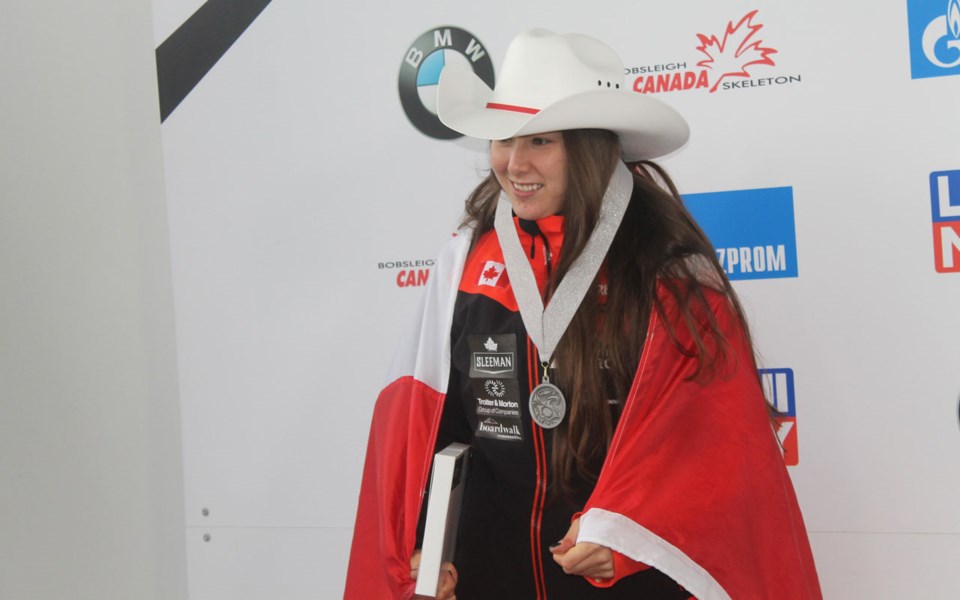After a jumbled-up and uncertain offseason, it was only appropriate that Jane Channell’s return to the IBSF World Cup tour was nearly as wild.
In the North Vancouverite’s first World Cup in nearly a year, at Königssee, Germany on Jan. 22, Channell hit the podium in a tie for third.
It took a shakeup to do it, though. The top two sliders after Run 1, German Tina Hermann and Russian Elena Nikitina, had both blazed down the track in unprecedented fashion, but struggled the second time down to end up in 10th and fifth, respectively.
Channell, whose home track is the Whistler Sliding Centre, trimmed her time in the second attempt, posting the second-fastest run to jump from seventh into a tie for third with Austrian Janine Flock.
“It was a bit of a crazy race. The top two both set track records in Run 1, so it was a shock to end up on the podium at the end of it all,” she said. “It was definitely an exciting race and I’m definitely excited for the outcome, to keep that momentum moving forward.”
Jacqueline Loelling of Germany came away with the win, while Czech Anna Fernstaedt placed second. The other Canadian in action was Elisabeth Maier in sixth.
Despite a mistake on her first attempt, Channell said she focused on everything that was going right, including equipment and line choice, and cleaned up in her next try.
“I was just really focused on executing what I could do and what I could control,” she said. “I was putting enough purpose behind each steer so that it was enough. That was the big mistake I made in Run 1, I was complacent with one of the steers and it caused a hit and skid.
“If I didn’t do that, with the splits and the speed, I would have been right in the pack there otherwise.
“It was a big confidence builder to execute Run 2 how I did,” she added.
Change of plans
Taking home a World Cup medal didn’t seem in the cards for Channell this season as she originally intended to forgo overseas competition and race closer to home.
“Originally, I wanted to stay local and only sled in Whistler,” she said. “I knew that going into the Olympic year next year that that would not be ideal. I’d be missing out on those races and being able to perform on demand, so to speak.”
Channell was hoping to stick to the North American Cup circuit, but when she was planning out her season, she could not compete on that tour without risking her World Cup ranking. The IBSF subsequently changed the rule, but Channell already had her itinerary settled where she’d stay in Germany, competing only at Königssee and Altenberg, the site of next month’s World Championships.
“Essentially, I’d be flip-flopping between only two tracks in Germany. I’d have my own rental car. I’d have my own hotel room. I felt OK and safe with the plan I had set out,” she said.
A different feel
Even with a season planned in such a way to prioritize safety, Channell admittedly has mixed feelings about taking part.
While she misses staples of the tour like socializing with friends on other teams and checking out the shops at each stop, Channell is well aware that the sense of loss is a universal experience.
“It feels like we shouldn’t be here, to be quite honest,” she said, noting the IBSF has advised athletes against wearing team gear in public. “Everyone here is shutdown, locked down as well.
“It’s a little bit like Twilight Zone in that you go from the track to the hotel and then back, and that’s it.”
Channell added that she’s grateful and feels fortunate for all those who put in extra work to plan out and enforce the protocols to allow athletes to compete in a safe manner this season.
That also goes for those here in Whistler, where she trained with the development group, the Snipers.
“The fact that the Whistler Sliding Centre is open right now and we’re still able to train in our sport is incredible,” she said. “Being out there with the young athletes and them challenging me to be the best that I can be, it was very humbling and brought me back to why I started sliding.”
Bobsledders narrowly miss podium
In bobsleigh action at Königssee, Canadian sleds were just off the podium.
In the women’s race on Jan. 24, in taking fourth place, Christine de Bruin and Sara Villani were 0.10 seconds out of the medals and 0.56 seconds out of first. Germans Kim Kalicki and Ann-Christin Strack earned the win over Stephanie Schneider and Tamara Seer, also of Germany, and Americans Elana Meyers Taylor and Sylvia Hoffman.
In the men’s two-man race on Jan. 23, Justin Kripps and Cam Stones were also fourth as German sleds took the top two spots. Francesco Friedrich and Thorsten Margis topped the podium while the Johannes Lochner and Eric Franke duo was second and Austrians Benjamin Maier and Kristian Huber placed third. Chris Spring and Mike Evelyn, meanwhile, were 10th.
In the four-man contest on Jan. 24, Kripps piloted his crew of Stones, Ryan Sommer and Ben Coakwell to fifth as Friedrich drove to the win over Maier and Lochner. Spring’s sled with Evelyn, Chris Patrician and Mark Mlakar took eighth.
Lastly, in men’s skeleton action on Jan. 22, Canadians Kevin Boyer and Mark Lynch placed 19th and 22nd, respectively. Germany’s Alexander Gassner earned the win over South Korea’s Sungbin Yun and Russia’s Alexander Tretiakov.




